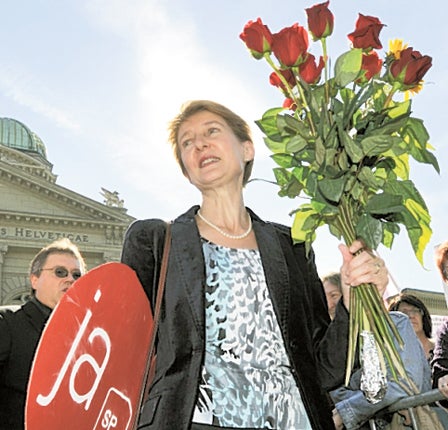Women take control of Swiss government

Your support helps us to tell the story
This election is still a dead heat, according to most polls. In a fight with such wafer-thin margins, we need reporters on the ground talking to the people Trump and Harris are courting. Your support allows us to keep sending journalists to the story.
The Independent is trusted by 27 million Americans from across the entire political spectrum every month. Unlike many other quality news outlets, we choose not to lock you out of our reporting and analysis with paywalls. But quality journalism must still be paid for.
Help us keep bring these critical stories to light. Your support makes all the difference.
Women gained a majority in Switzerland's cabinet for the first time yesterday – less than 40 years after the country became one of the last in Europe to allow them to vote in national elections.
The era of male-dominated politics was ended by Simonetta Sommaruga, a popular Social Democrat, who was elected the fourth woman in the republic's seven-seat federal council.
Mrs Sommaruga, 50, a financial adviser and consumer protection expert, defeated her nearest rival, Jean-François Rime, of the rightwing and xenophobic Swiss People's Party (SPP), in the contest for the post after securing a lead of 78 votes in parliament. Her election made Switzerland the fifth country in the world to have a female-majority government after Norway, Spain, Finland and the Cape Verde Islands. Women also hold about a third of the seats in the Swiss parliament.
Political observers welcomed the development. "In a country with a conservative reputation, it is symbolically a rather powerful message to have four or five women out of the seven seats in government," said Pascal Sciarini, the head of political science at Geneva University.
Women have traditionally been afforded a secondary role in Swiss public life. They were not permitted to vote at regional or "canton" [divisional] level until 1959, with the last canton of Appenzell Inner Rhodes finallygranting women full voting rights in 1990. Women were given the vote in national elections in 1971. Although the first female government minister was elected in 1984, until yesterday only six women had held cabinet posts.
As she accepted the role, speaking in French, Italian and German, Mrs Sommaruga said the government should work hard to further the rights of minorities. Her words seemed directed against the SPP, which has generated negative publicity for the country with its campaigns against immigrants and the building of minarets at mosques. "The majority must take all minorities into consideration, be they cultural, linguistic, religious, political or of any other nature," she said.
Several female politicians said the new cabinet did not reflect the realities faced by most women. "You get the wrong picture if you just look at the government," said Claudine Essevia, of the Swiss Free Democratic Party, noting that German-speaking areas were less inclined to accept women MPs than the French-speaking West. "It is still a man's world," she added.
Businesswomen said their gender was under-represented in their field. "Women gained the vote very late and achieved a high level of representation in politics," said Doris Aebi, a recruitment consultant in Zurich. "It is different in business." Switzerland has only five women in its 100 top bankers.
Schools and universities have been accused of undermining women by disseminating outdated ideas about their role in society. The female majority in cabinet could be lost next year when all posts are up for re-election.
Subscribe to Independent Premium to bookmark this article
Want to bookmark your favourite articles and stories to read or reference later? Start your Independent Premium subscription today.
Join our commenting forum
Join thought-provoking conversations, follow other Independent readers and see their replies
Comments